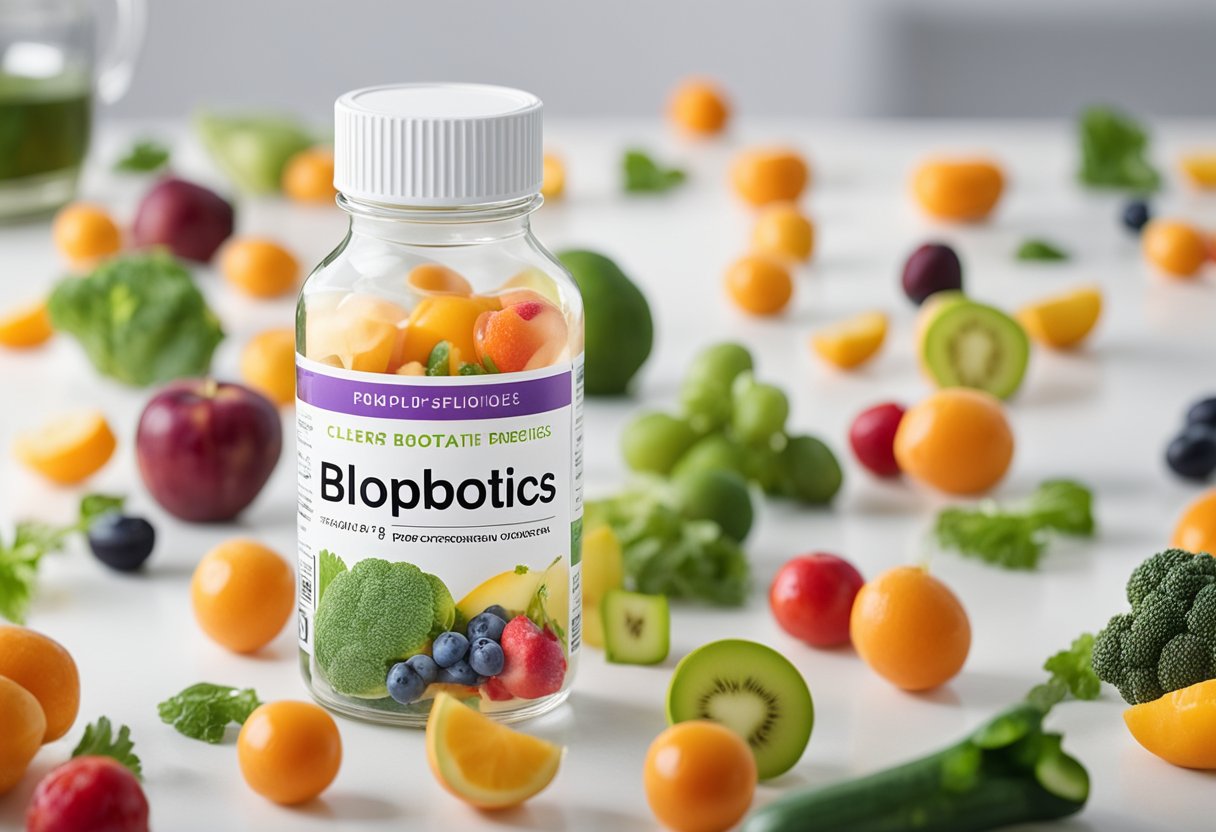Bloating is a common digestive issue that arises when your gut becomes filled with excess gas or air, leading to discomfort and swelling in your abdominal area. You might find yourself dealing with bloating due to various reasons, such as your diet, stress, or underlying gastrointestinal disorders like irritable bowel syndrome (IBS). While it can be an occasional inconvenience for some, for others, bloating can be a persistent and distressing symptom that affects their daily lives.

Probiotics have gained attention as a potential remedy for alleviating bloating. These beneficial bacteria are thought to support gut health and enhance digestion by restoring the balance of the intestinal microbiota. Probiotic supplements and fermented foods introduce these microbes into your system, potentially helping to manage and reduce bloating by combating imbalances that lead to gas and discomfort.
When considering probiotics as a solution to bloating, it’s essential to choose the right strains and formulations. Not all probiotics are created equal, and their efficacy can depend on factors like the specific strains included, the dose, and whether they’re suited to your individual health needs. It’s always recommended to consult with a healthcare professional before starting any new supplement regimen, especially if you have underlying health conditions.
Understanding Probiotics

In your journey to manage bloating, grasping how probiotics work is fundamental. These beneficial bacteria can offer relief by enhancing your gut health.
Defining Probiotics
Probiotics are live microorganisms that, when administered in adequate amounts, confer a health benefit on the host. They are typically found in fermented foods like yogurt and kefir, as well as dietary supplements. Probiotics are akin to the naturally occurring bacteria in your gut, contributing to a balanced intestinal flora.
Mechanism of Action in Alleviating Bloating
Your gut hosts a complex community of bacteria which play a critical role in digestion and overall health. When this balance is disrupted, symptoms like bloating can occur. Probiotics help by:
- Restoring Balance: They repopulate the gut with healthy bacteria, displacing gas-producing bad bacteria.
- Enhancing Digestion: Some probiotics can speed up the movement of food through the digestive system, reducing the likelihood of gas buildup.
By understanding the role of probiotics in your digestive system, you can make informed decisions to potentially ease the discomfort of bloating.
Efficacy of Probiotics for Bloating

Probiotics are commonly consumed to address bloating, especially for those experiencing symptoms like IBS. Understanding their effectiveness and the science behind different strains can guide you in choosing the right probiotic.
Scientific Research Findings
Scientific studies indicate that certain probiotics may alleviate bloating by improving the balance of gut bacteria. A systematic review acknowledged that in some patients with IBS, specific probiotics can lessen bloating and distention while enhancing bowel movement frequency and consistency. Another piece of research highlighted that an imbalance in gut microflora, or dysbiosis, often triggers symptoms such as bloating. Probiotics can help correct this imbalance, promoting a healthier gastrointestinal environment.
- Evidence Level: Moderate
- Key Benefit: Reduction in bloating for IBS patients
- Secondary Benefit: Improved bowel regularity
Comparative Analysis of Probiotic Strains
When exploring probiotics for bloating, it’s important to compare strains as their efficacy can vary:
- Lactobacillus acidophilus: Known for gut health enhancement and potential in easing digestive complaints, including bloating.
- Bifidobacterium bifidum: May reduce symptoms of IBS, including bloating and irregular bowel movements.
- Saccharomyces boulardii: A yeast probiotic that can contribute to the improvement of intestinal microflora balance.
Effectiveness of Various Probiotic Strains:
| Probiotic Strain | Efficacy for Bloating | Notes |
|---|---|---|
| Lactobacillus acidophilus | Potentially Beneficial | Commonly used for general gut health |
| Bifidobacterium bifidum | Likely Beneficial | Often recommended for IBS-related bloating |
| Saccharomyces boulardii | Moderate Evidence | Can help restore balance of gut microbiota |
Probiotics are not a one-size-fits-all solution and the right strain may depend on the individual’s unique gastrointestinal environment.
Usage Guidelines for Probiotics
In managing bloating with probiotics, it’s essential to adhere to specific usage guidelines, including recommended dosages, administration methods, and being aware of potential side effects.
Recommended Dosages
For most probiotic strains, a daily dosage ranging from 1 billion to 10 billion colony-forming units (CFUs) is commonly suggested. However, the exact dosage can vary based on the specific strain and brand. For instance:
- Lactobacillus GG: Typically recommended at ≥10 billion CFUs per day for a duration of 5-7 days.
- Saccharomyces boulardii: Commonly used at doses of 250 to 500 mg daily.
Administration Methods
Probiotics can be administered in various forms including:
- Capsules or pills: Taken orally, usually with water.
- Powders: Can be mixed with liquids or soft foods.
- Yogurt or fermented foods: Naturally contain probiotics and can be included in your diet.
To optimize effectiveness, take probiotics on an empty stomach or just before a meal.
Potential Side Effects
While probiotics are generally considered safe, they can cause some side effects, especially during initial use. These include:
- Digestive symptoms: Such as gas or mild bloating, which typically resolve with continued use.
- Allergic reactions: Rare, but possible, especially in those with allergies to dairy or other ingredients in probiotic formulations.
Selecting the Right Probiotic Supplement
When seeking relief from bloating, choosing the correct probiotic supplement is crucial. Quality and the specific needs of your body are key considerations.
Criteria for Quality Probiotics
To ensure you’re selecting a high-quality probiotic, consider the following:
- Strain Specificity: Look for supplements with strains that target digestive health, such as Lactobacillus and Bifidobacterium.
- CFU Count: Aim for a colony-forming units (CFU) count appropriate for your needs, typically in the billions.
- Purity and Potency: Select supplements that have been third-party tested for potency up until their expiration date.
- Survivability: Ensure the probiotic can survive stomach acid to reach the intestines where it’s needed.
- Allergen Information: Check for potential allergens like dairy, gluten, or soy if you have sensitivities.
Probiotic Foods vs. Supplements
While you can receive probiotics from natural sources or dietary supplements, each has distinct advantages.
- Probiotic Foods:
- Natural Sources: Examples include yogurt, kefir, sauerkraut, and kimchi.
- Added Benefits: Foods provide additional nutrients and can naturally fit into meals.
- Supplements:
- Concentration: They typically offer a higher, more precise CFU count.
- Convenience: Supplements offer a straightforward way to consume specific strains of probiotics consistently.
Integrating Probiotics into Your Diet
Integrating probiotics into your diet can support digestive health, particularly if you experience bloating. Here’s how to naturally include these beneficial bacteria in your daily meals.
Probiotic-Rich Foods
Fermented Foods:
- Yogurt: Look for labels that say “live active cultures.”
- Kefir: A fermented milk drink known for its high probiotic content.
- Miso: Made from fermented soybeans, often used in soups.
- Sauerkraut: Fermented cabbage, ensure it’s unpasteurized for live bacteria.
- Kimchi: Spicy Korean dish made of fermented vegetables.
Supplements:
- Probiotic Capsules/Tablets: Found in the health supplements aisle.
- Probiotic Powders: Can be mixed into liquids or sprinkled on food.
Incorporating Probiotics with Meals
Breakfast:
- Add yogurt or kefir to smoothies or cereals.
Lunch:
- Use miso dressing in salads or include a side of kimchi with your sandwich.
Dinner:
- Start with a miso soup appetizer or a fresh sauerkraut salad.
Snacks:
- Opt for yogurt dips with fresh vegetables or have fermented pickles as a quick bite.
Remember to introduce probiotics gradually to minimize potential initial discomfort, such as increased gas or bloating, as your system adapts.
Frequently Asked Questions
In this section, you’ll find targeted answers to common questions regarding the use and effects of probiotics for bloating and gas discomfort. Each question addresses a specific aspect, ensuring you gain a comprehensive understanding of probiotic use for digestive health.
What are the top-rated probiotics for easing bloating and gas discomfort?
For reducing bloating and gas, probiotics containing strains like Bifidobacterium lactis, Lactobacillus acidophilus, and Streptococcus thermophilus are among the top-rated due to their proven efficacy in improving digestive health.
Can probiotics assist in weight management and relieve bloating?
Probiotics contribute to a healthy gut, which can play a role in weight management. While their primary function is not weight loss, a balanced gut flora can aid in digestion and potentially reduce bloating related to diet.
When is the optimal time of day to take probiotics to alleviate bloating?
The optimal time to take probiotics is generally on an empty stomach, which often means right after waking up or just before bedtime. This allows the probiotics to transit more efficiently to your gut without interference from food.
Are there specific strains of probiotics recommended for women’s digestive health, particularly for bloating and gas?
Yes, certain strains like Lactobacillus reuteri and Lactobacillus rhamnosus have been researched for effects on women’s digestive health, showing potential benefits in reducing bloating and improving gastrointestinal function.
Can regular intake of probiotics help in reducing abdominal bloating, and if so, how quickly?
Regular intake of probiotics can help in reducing abdominal bloating. While the time frame can vary from person to person, improvements can generally be observed within a few weeks of consistent probiotic intake.
Beyond supplements, what are natural sources of probiotics that can help with bloating?
Natural sources of probiotics include yogurt, kefir, sauerkraut, kimchi, kombucha, and other fermented foods. Including these in your diet can support gut health and may alleviate bloating.

Johan Theorin is an author, editor, and competitive cyclist. He is the author of most of the content on this website, and he is the site editor. Johan has spent years researching joint health, sports performance and recovery. He is a leading biohacking expert and an experienced physiotherapist.
Leave a Reply